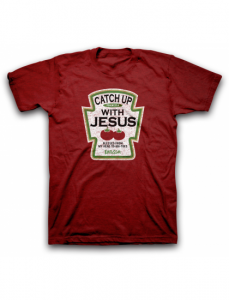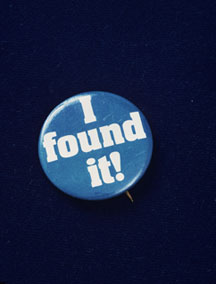If you’re a Jesus Person of a certain age and had a subversive streak, you probably remember the old Wittenburg Door magazine.* If you don’t, here’s a link to a 1986 Sun-Sentinel article about the Door that snapshots its role and voice, back in the day. The magazine simultaneously skewered the worst of Christian subculture, had great book and movie reviews, and offered some meaty articles by writers like the late Mike Yaconelli, Sheldon Vanauken and Tony Campolo and Tom Sine. It also included interviews with people like Paul Little, Marabel Morgan, and Mark Hatfield. 
The Door had a special feature called the “Loser of the Month”, or the Green Weenie Award. It highlighted the most squee-inducing forms of religious-themed merchandising shenanigans including memberships in Christian nudist colonies and the Cabbage Patch Jesus doll.
Even with booster shots of Greenie Weenie innoculating me from the temptation to buy the weirdest merch, I’ll confess to purchasing and wearing a few pop-culture derivative Christian tee shirts (like “Jesus: He’s The Real Thing”, an homage to the 1970’s Coca-Cola ad campaign) for myself and my family members. A few of my cars sported the ichthus fish symbol. I think I may have won a Romans 8:28 coffee mug at a women’s event. Ever since former ballplayer Billy Sunday mixed his pop culture sports celebrity with a gospel message, Evangelicalism has been quick to adapt popular culture’s merchandising of both celebrity and stuff. The best of us did so in the name of getting the Word out. The worst, in the name of making a quick dollar. Few were doing the hard work of critical thinking about the real message we were communicating to ourselves and to the watching world when we Boomers bought tchotchkes imprinted with Bible verses and slogans.
We’re a generation removed from the Jesus Movement of the late 1960′s. Poll after poll tells us that Evangelicalism, the primary beneficiary of this Movement, is having an identity crisis. A sizable percentage of our children aren’t sticking around in our churches – and neither are many of us. We are known in caricature for our culture warring and mean-girl ways. Jesus is our brand, not our Lord. Certainly not all of us fall into this category, of course. I’m grateful for the numerous faithful Evangelical saints who reflect the love of Jesus through their words and works.
As I’ve noted earlier in this series, when a renewal movement hits the church, things are bound to get messy. Some of the mess is the work of the Holy Spirit as he reanimates dry bones. Some of the mess comes when a bunch of broken human beings try to touch, help, hinder, or profit from the beautiful chaos. The Jesus Movement birthed countless slogan-emblazoned tee shirts, bumper stickers, figurines and Scripture-emblazoned pencils, mugs, welcome mats, breath mints, and yes, koozies.
Is our stuff how we’re to bear witness to our faith? What have we reaped from what we’ve sown in the wearing and buying of this Christian swag? Evangelicalism is in a time of deep transition. The transition is an opportunity for a bit of spiritual housecleaning in the wake of the hippie-flavored chaos of a generation ago. Part of that housecleaning should create some space for reflection on the unintended consequences of some of our choices and desires. Today, I’d love your thoughts on the consequences of a generations’ worth of tee shirts and bumper stickers.
What we wanted when we bought, wore, or were gifted an item with a Christian slogan or Bible verse emblazoned on it: 
- An easy conversation starter – A way to jump into a faith conversation with a not-yet-believing friend, co-worker or stranger.
- A marker of our identity – a bold way to let the world know we’re committed to Jesus.
- A prompt for our own piety – For example, it puts a little additional pressure on us to behave behind the wheel if our bumper stickers tell the world if God is our co-pilot.
- A way to be in the world, not of the world – Wearing a Christian tee shirt with a message derived from Madison Avenue seemed to be a way to simultaneously demonstrate cultural relevance while proclaiming our distinctiveness from that culture.
40 years later, we got:
- A little sillier – We did the Christian version of the Portlandia “Put A Bird On It” marketing strategy, and diminished by dilution the power and beauty of the Word of God.
- A little shallower – By reducing eternal truth to slogans on consumable merchandise, we communicated to ourselves that discipleship could be as simple as believing and buying. A set of kitschy potholders printed with a Bible verse on them aren’t the problem. They are a small symbol of the unintended consequences of “mile wide, inch deep” faith-as-brand.
- Poorer – Most of us didn’t break the bank buying this stuff. But we in the Evangelical church diminished our own ability to cultivate artistic expression (which tends to be more about raising questions instead of delivering slogan-y answers) and respond to complex issues with glib responses.
- A narrow kingdom view – A pretty large percentage of our Christian-themed swag has been made in China. Christian mega-retailer Hobby Lobby got caught in the crossfire of this issue a couple of years ago. Christian bookstores sell plenty of gift items made in China as well. It’s only been recently that believers have begun to question the kingdom ethics of buying Christian-themed stuff made in a country with an abysmal, anti-Christian human rights record.
What would you add to either of these lists?
* My poem, Necessities, was in the October/November 1982 issue. It was one of my first published credits.
















